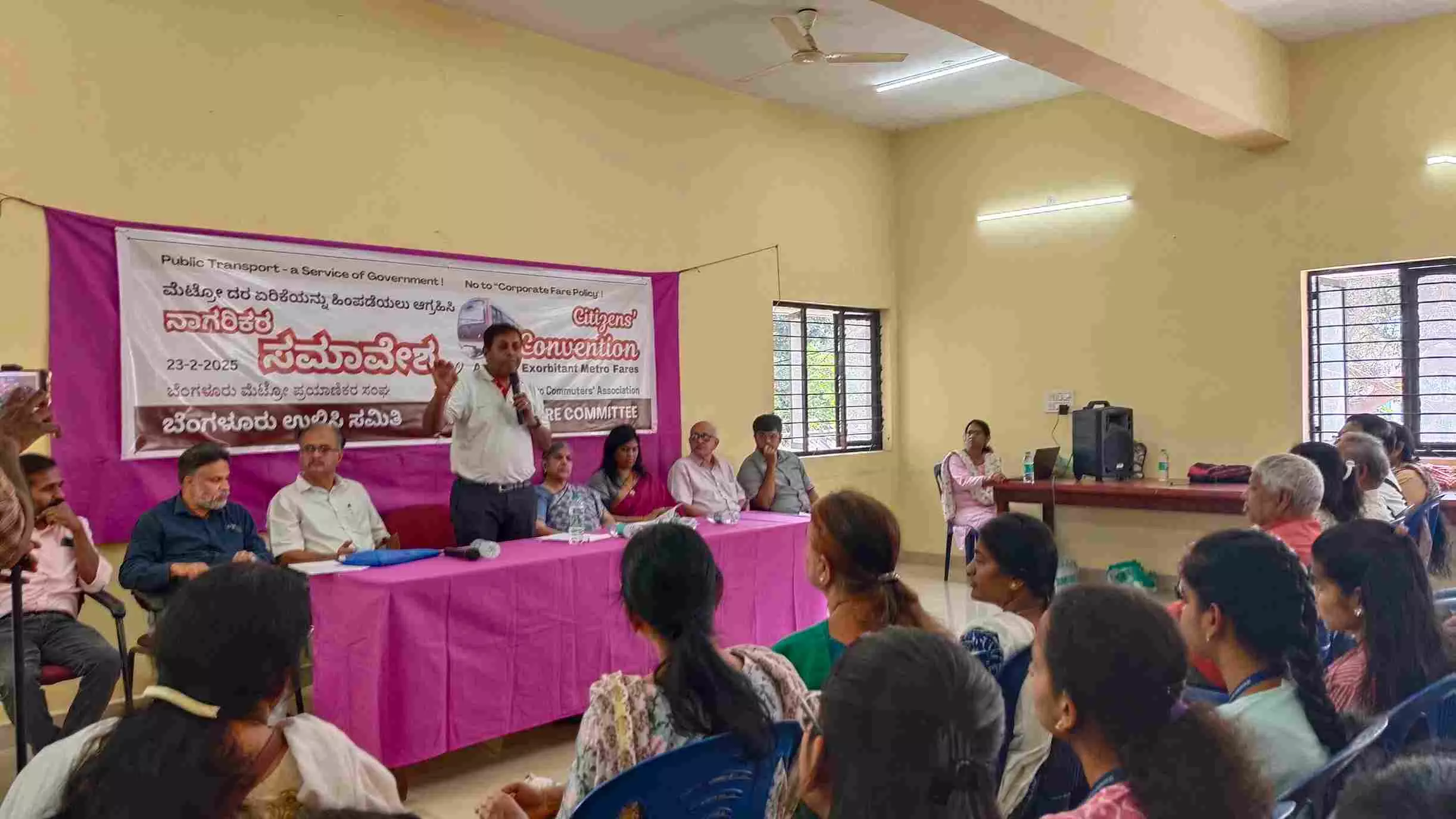
Bengaluru Metro passengers' body protest: 'Metro is not business, it's service'
Mobility experts and civic society members say it is the responsibility of the govt to provide an affordable transport system that is accessible to all

The protests over steep Metro fare hikes in Bengaluru show no signs of let-up.
Participants at a civic meeting, organised by Bangalore Metro Commuters' Association (BMCA), an affiliate of the Save Bengaluru Committee (SBC), emphasised that public transport should not be a commercial enterprise like Ola and Uber, and it is the duty and responsibility of the government to provide an affordable transport system. The protests are intensifying amid reports of Bengaluru Metro ridership plunging by at least 1 lakh ever since fares were hiked.
Addressing the meeting, Dr Ashish Verma, professor of Transport Systems Engineering at IISc, Bengaluru, said the need of the hour is to reduce traffic congestion and create a transport system that is accessible to all.
Also read: For crawling Bengaluru, Metro fare hike is a bolt from the blue
‘Don’t burden passengers’
“Public transport systems complement air pollution control and improvement in public health. The socio-economic benefits of investing in public transport systems are huge. Therefore, the financial burden of building public transport should not be placed on passengers' shoulders. The government should reduce the financial burden through strategic funding and subsidies,” Dr Verma said, later citing many global examples.
Flaying Namma Metro's move to prioritise profits, he said, “Public transport services should focus on increasing ridership rather than worrying about revenue. There is a need for greater transparency and public input in the fare-setting mechanisms.”
Speaking to The Federal Karnataka, Dr Verma said, “If you take cities around the world, the idea of making Metro profitable is not practical. Public service cannot be run on a business model. Many rich countries or cities subsidize their public transport systems so that more people use them. This, in fact, leads to a better standard of living,” he said.
People-centric approach
Karnataka Medical Service Centre president Dr Sudha Kamath said that Bengaluru was once a ‘pensioner's paradise’, now a huge city of ''asthma patients'', thanks to increasing pollution and congestion.
''With people suffering from respiratory diseases due to traffic congestion and pollution, Metro is the only solution. However, just like the healthcare sector, the corporatisation of public transport is not right. People are already contributing through taxes. Therefore, the governments should be held accountable,” she said.
Dr Meghna Verma, associate professor at Ramaiah Institute of Management, stressed the importance of the Metro as an easily accessible public transport for women and the disabled. “The fare hike will harm this community. A progressive city like Bengaluru needs a functional and affordable Metro system. The government should adopt a people-centric approach,” she said.
Also read: Vaishnaw blames Karnataka govt for Bengaluru Metro fare hike
Where has the cess gone?
VN Rajashekar, a member of the Save Bengaluru Committee, said that the Metro fare hike is being justified to repay loans and cover operational costs. “It is said that it aims to earn ₹3 crore per day (₹1,080 crore annually). By 2029-30, this will increase to ₹7.6 crore per day (₹2,776.58 crore annually). So, will the fare be increased four times then,” he wondered. He also asked where had the Metro cess (collected over 5 years) gone and demanded accountability.
N Ravi, of the Save Bangalore Committee, questioned the need for the fare hike, pointing to the increasing prices of essential goods. He cited the Save Bangalore Committee's successful track record of creating a park in Kumaraswamy Layout and resolving water issues in Bangalore through public mobilisation.
Quoting Leo Tolstoy, Ravi said, ''The government's strength lies in the disunity of the people.'' So, the public should rise collectively against such anti-people policies, he said.
Signature campaign
The organisers said a signature campaign had been carried out across the city condemning the increase in Metro fares, and more than 10,000 signatures were collected.
''A petition will now be submitted to the Karnataka Chief Minister, Governor, and the Central government, seeking immediate rollback of the prices. Subsequently, the future course of action will be chalked out,'' said BMCA representative Rajesh Bhat.
'One Nation One Price'
Sharing his views in the meeting, a Metro passenger Jayant Sileen said, “I have to travel by Metro every day for my job. The fare has now doubled. When I inquired about the Metro card from the staff, they informed me that it was a ‘One Nation One Card’. He said that one can travel in any Metro in the country with this card. So if one can travel in all Metros, why not have 'One Nation One Price'?”
Also read: Centre responsible for Bengaluru metro fare hike, BJP spreading lies: Karnataka minister
An interaction was held with the public, with many citizens, mostly students, expressing serious concerns over the Metro fare hike.
The meeting was also addressed by Prof. Murigeppa, former Vice-Chancellor of Hampi Kannada University, representatives from various organizations, Deepti from Breakthrough Science Society, and Dr. Gangadhar from the Medical Services Centre.
This article first appeared in The Federal Karnataka

